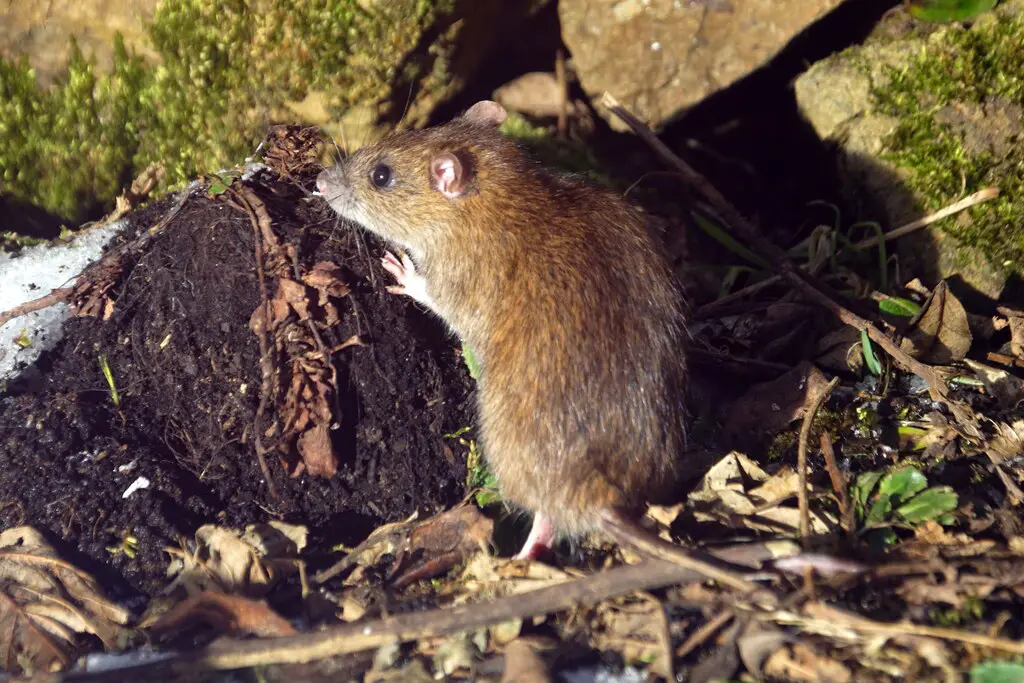Yes, compost can draw rats, leading to a rat infestation problem. But it also depends on your composting system, though. Ways to repel rats include burying the food deep into your pile, using a Bokashi system and keeping the compost moist at all times.
Rats are drawn to the safe, warm environment of compost as a haven. The organic matter in food scraps, kitchen waste, and other compost materials offers a ready-to-use food source to aid in rat nesting and raising offspring.
Table of Contents
Do Compost Piles Attract Rats?
Rats are attracted to compost heaps. It’s vital to note that it’s not the compost heap that draws them into your compound.
Their existence in your compost bin implies that they were formerly in your home.
Do Compost Bins Attract Mice and Rats?
Yes. Compost bins serve as a food source, habitat, and a comfortable area for rats to nest.
Kitchen scraps are constantly added to the bin, which provides warmth and easy access to food during the composting process. That makes the compost bin advantageous during winter.
Vermin chew on hard objects to manage their tooth growth as they mature, making wooden and certain plastic bins less of a barrier if the rats can smell the decaying food within the bin.
Do Compost Tumblers Attract Rats?
No. Rats cannot enter compost tumblers.
This home composting method is one approach to creating a rat-proof compost. It helps to isolate the tumbler by keeping it elevated.
They are also completely closed, so the rats cannot feast on the food waste.
Signs of Rats in Your Compost
The following are signs that your compost has a rat infestation:
1. Burrows
Rather than overground, rats move underground and use burrows to reach your compost pile.
Burrows are a clear indicator that rats visit your compost pile.
Check for tunnels with a diameter of 2-4 inches.
Mice may also dig, but they choose to roam above ground and leave droppings and much smaller burrows.
2. Damaged Bin
If you have a sealed plastic bin, you may see damage or gnawing. That is particularly common when rats need to eat it to access your compost.
Rats gnaw through plastic, so if you want to prevent them from just biting through it, you’ll need strong wire mesh.
Materials That Attract Rats to Your Compost
Rats will consume nearly any rotting food, including animal flesh and bones, decomposing fruits and vegetables, eggshells, and peelings.
The stench of the disintegrating organic materials and the potential for a meal will draw rats to your compost.
Experts advise against composting cooked food, dairy products, fish, or meat.
Do Rats Nest in Your Compost
Yes. Compost heaps or bins offer protection from danger, making them a desirable spot to rear offsprings. Also, compost serves as a significant barrier against the cold.
Let’s say, for instance, that you have a huge heap. The shielding value is higher, making conditions even more suitable for rats.
A compost pile that is in use also produces heat. It’s similar to having a tiny radiator for keeping rats cozy.
Do Rats Eat Your Compost
Rats are not drawn to compost piles because of the finished compost.
In contrast, the additional food scraps attract rodents and other scavengers, mainly if you include the materials we discussed earlier.
5 Ways to Keep Rats Out of Your Compost
Here are some tips about how to keep rats away from your compost:
1. Bury the Food Waste in the Heap
When adding kitchen scraps to your compost bin, dig a little into the pile, place the waste there, and then cover it. You can add a few layers of leaves or grass clippings to the food scraps.
Rats might not locate your composter if they cannot see or smell the kitchen scraps.
2. Avoid Composting Food Scraps
If you are dealing with a rat problem, you might want to completely avoid mixing food waste with other materials in the compost pile. But don’t throw away those priceless scraps.
Instead, you can set up a vermicomposting bin for the kitchen scraps. You also can bury them in your garden’s compost trenches.
3. Use Bokashi
If you employ Bokashi to manage kitchen waste, chances are you are already accustomed to the smell of fermented food scraps. Not even the most ravenous rat can eat food waste fermented by Bokashi.
The process is quite straightforward:
- Fill the Bokashi bucket with the organic food waste.
- Layer on some Bokashi bran.
- Allow the materials to sit for around two weeks.
- Add the items to the compost bin.
- This mixture breaks down fast, and rats won’t come near it.
*Bokashi systems available on Amazon.
4. Keep the Compost Components Moist
Making sure your compost is moist throughout the process and not soggy can avoid unpleasant odors and anaerobic conditions. Such conditions are not favorable for rats to make their home.
You may make your pile far less inviting to rodents during dry spells by turning it regularly and providing it with some water.
5. Plant Some Mint Nearby
While most people find the smell of mint to be pleasant, rats avoid it alongside other potent odors like animal urine and ammonia.
Put cotton balls or rags in spots where you suspect or have seen rats after soaking them in some drops of peppermint oil.
It’s worth trying, even though it’s one of those suggestions that will work for some people only.
It’s doubtful that a small amount of mint will totally repel rats in an area with a large or voracious rat population.

